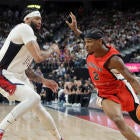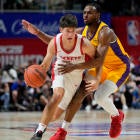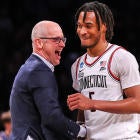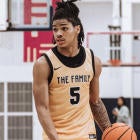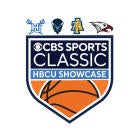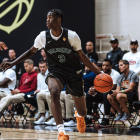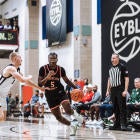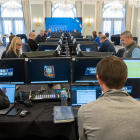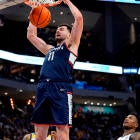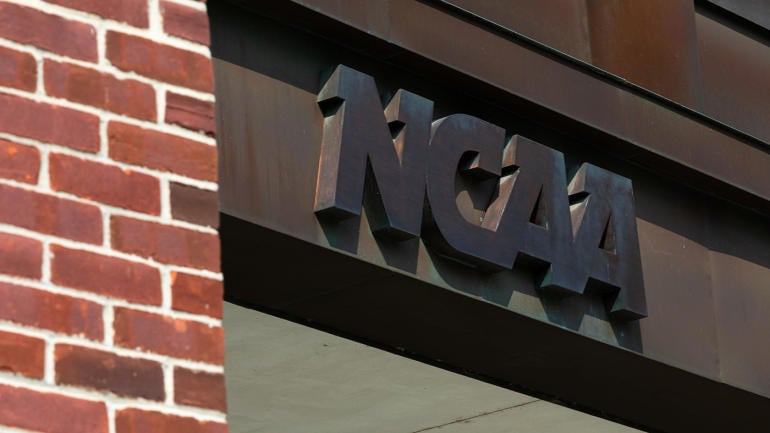
NEW ORLEANS -- Take a good look at NCAA enforcement as Final Four week begins. This may be its last stand.
Big Brother's oversight can't endure because it almost assuredly won't. Part of what's being evaluated at the ongoing NCAA Transformation Committee meetings is an evaluation of the laborious, unfair enforcement process. At least that's the way it is perceived to a large swath of the membership who've had enough.
Congress certainly agrees. On Tuesday, the NCAA Accountability Act of 2021 was released. The bipartisan bill would limit investigations to eight months and cut the statute of limitations from four years to two years.
Even if the bill fails, there is still a real possibility the schools themselves take over the process by the end of the summer. Perhaps the divisions (I, II, III) have different sets of rules. Perhaps the conferences police themselves.
The hope is the process gets streamlined. It could become more complicated, but it won't be the same. And either way, it must be better.
Whatever happens, there will be fewer rules, not more. Name, image and likeness legislation has provided a glimpse of what paying players looks like. What used to be below the table is now (mostly) an accepted part of doing business.
So, take a good look. No. 1-seed Kansas is both a Final Four favorite and a poster child this week. Bill Self, already a hall-of-fame coach, is gunning for his second national championship. The NCAA is gunning for him and his program. The Jayhawks have been charged with five Level I violations, one levied against him directly for allegedly violating the coaches' responsibility bylaw.
Self and KU have maintained -- from the beginning – that they disagree with a large portion of the NCAA's allegations.
All of it stems from those FBI cases revealed in September 2017. There are now literally men in jail for taking actions that might be allowed by the NCAA in the future.
Really, what's the difference between an Adidas rep paying a recruit to attend a school and signing a high school junior to a potential $8 million NIL contract?
The sides might as well have officially squared off a year ago. On the day before the Final Four, Kansas gave Self a lifetime contract. Not only did KU hijack the news cycle for a few hours on the day before the NCAA's biggest event, it included a clause in the extension that said Self cannot be fired "due to any current infractions matter".
In case you need a translation, that was one of the biggest middle fingers to the NCAA in recent memory.
Despite the allegations, Self remains one of the most respected and admired coaches in the game.
You shouldn't have to be told about the reputation of NCAA enforcement. As we move further away from September 2017, it's getting more difficult to call any of it a scandal.
The FBI's announcement spurred one of the largest enforcement engagements in NCAA history. The upshot today is that the membership is sick and tired of cases that take years to resolve. Powerful SEC commissioner Greg Sankey set a six-page letter to the NCAA in 2020 saying the association suffers from a "crisis of confidence" due to a flawed enforcement process.
Coincidentally, Sankey is co-chair of the transformation committee that is considering the future of enforcement as part of a streamlining of the NCAA. It's all part of a strategic, general stepping aside by the NCAA.
The Independent Accountability Resolution process that is deciding the Kansas case, among others, has been failure. That doesn't mean shady characters didn't do shady things. But the net result is otherwise experienced administrators and investigators from outside the NCAA who were hired to populate the IARP have found themselves having to reinvestigate cases handed to them by the enforcement division.
That's a lot of money thrown at a problem to be solved by administrators and investigators who are inexperienced at what they're doing.
Result: The NCAA has put a hold on the IARP accepting more cases. FBS athletic directors have called for its end citing "major flaws" in the process.
One source termed the relationship between NCAA enforcement and the IARP as "adversarial". Earlier this year, Kansas reportedly attempted to convince the IARP of an "alternative resolution" that would speed up the process.
The problem is no one really knows what that looks like. It's never been attempted before with an entity that is only four years old. Meanwhile, Kansas' hearing to resolve the case is not close, CBS Sports has learned.
While Kansas and its peers might not be sympathetic figures, the longer this slog goes on, the more it leans that way. The point of enforcement is to change behavior.
Amid its scandal, Arizona changed coaches, won the Pac-12 for the first time in four years and advanced to the Sweet 16. Louisville is fighting the NCAA. Memphis, the same thing.
Oklahoma State is beyond angry that it got a postseason ban in 2022 after its appeal was denied. So much so that coach Mike Boynton made a point to read off the NCAA staffers involved.
Meanwhile, Kansas is like a lot of programs past and present involved in investigations. It continues to prosper. The blueblood is in another Final Four. Amid the troubles. the program has landed two top-25 prospects in the 2022 recruiting class.
Let's just say it looks like Self is going to be around longer than the current enforcement process.
The process must have its hypocrisy removed. You might have noticed last week Sean Miller made it back into the game a year after being fired at Arizona. He was rehired at Xavier where Miller had spent six seasons. But he got hired by AD Greg Christopher, who -- wait for it -- was on the NCAA infractions committee from 2012-20 and had been chair of the committee since 2017.
If you need to be led by the hand: Christopher was the chair of the committee while the NCAA was drawing up a notice of allegations against Arizona. While the infractions committee isn't necessarily directly involved with the NOA, it certainly has intimate knowledge of the cases.
"[Christopher] had to have knowledge," said a person familiar with the process.
You don't have to be an infractions czar to know that the Arizona NOA carried five Level I allegations, including one against Miller for lack of head coach responsibility. (He was not named directly for any individual violations.) All you had to do was read your notifications.
Miller was fired amid the investigation last April. Christopher hired him less than a year later. Miller is back at work. The Arizona case was accepted into the dreaded IARP process in December 2020 where it sits today with no chance of appeal.
"From an athletics director perspective, we have to take accountability, not just on our own campuses but within the governance structure as well," Christopher said in 2017 after taking over as chair of the committee.
If you must ask what message is being sent here, you're not paying attention. Few really pay a long-term price in this process. That is, unless you're one of the innocent athletes who have been punished over the years.
In a previous life, Houston coach Kelvin Sampson was blackballed by the NCAA for violations folks laugh at these days: impermissible phone calls and texts to recruits.
The ground is shifting under everyone's feet. The point is not to fall.
Adidas last week announced a nationwide NIL network that, it says, could pay 50,000 college athletes at its 109 brand-affiliated schools. In that FBI sting, Adidas is alleged to have conspired with schools to lure athletes to top basketball programs.
These days, is there much of a difference between those two sentences?
Gonzaga's Drew Timme became at least the most visible college athlete -- maybe even the first -- to do a commercial for a casino earlier this month. The establishment was local, and you came away from the ad chuckling. The production was first rate. It didn't feel like you needed a shower after watching it.
Maybe we as a society have become accustomed the co-mingling of colleges and sports gambling, but what Timme did would have rendered him ineligible as recently as a year ago.
Caught in the middle is the NCAA and its relevancy as a new constitution being written.
The association is slowly backing away from academic oversight. An association task force last year recommended standardized test scores no longer be used. Like everything else these days with the NCAA, it boils down to legal liability. It's getting harder to defend SAT/ACT requirements in regard to racial equity.
The California State University system has temporarily suspended the use of the SAT and ACT. Tennessee will not require those initial eligibility scores from applicants through 2025.
So, what's left in the enforcement process? Something cursory, it seems. Let schools define academic fraud. Maybe more attention will be paid to violations of the 20-hour work week for athletes. As mentioned, NIL has taken care of a large part of the NCAA Manual. Athletes have become walking brands who may never look back.
In the future, the NCAA will be limited to staging a heck of a basketball tournament, which it does well. Congress isn't coming through that door anytime soon to bail it out on NIL. The next stop for player empowerment may be collective bargaining. The College Football Playoff is destined to take over that sport.
It's a shame, then, Saint Peter's didn't make the Final Four for another reason. The school's former president, Fr. James Loughran, put the enforcement dilemma in perspective.
"Your efforts are doomed to fail if you take your mandate to be 'reform,'" Loughran told the Washington Post. "If you allow to continue the business-as-usual pattern of legislating more rules and calling for more vigilant enforcement while at the same time negotiating ever more lucrative TV contracts, million-dollar endorsements, and the like. You have a chance to succeed only if you acknowledge the contradiction built into big-time sports and force a choice between professionalism and amateurism, dollars and academic integrity. …
"You will fail unless you separate winning and money."
Loughran died in 2006, but his words ring true today.









